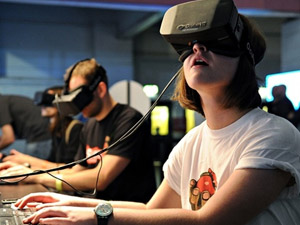



Date:10/07/17
 Ericsson has published its latest ConsumerLab report - Merged Reality - revealing insights into how consumers expect virtual reality (VR) and augmented reality (AR) to merge with physical reality, and that 5G will be a key technology for such experiences to become mainstream.
Ericsson has published its latest ConsumerLab report - Merged Reality - revealing insights into how consumers expect virtual reality (VR) and augmented reality (AR) to merge with physical reality, and that 5G will be a key technology for such experiences to become mainstream.
The report reveals that when boundaries between people's perception of physical and virtual reality start to blur, this could result in a drastic impact on lives and society. The way we live, work, and consume information and media will fundamentally change.
Realities will not merge if the user is tethered to a computer or cut off from physical reality. Early adopters of VR/AR expect next-generation networks like 5G to play a central role. Thirty-six percent have expectations on 5G to provide VR/AR mobility through a stable, fast and high-bandwidth network. Thirty percent of early adopters also expect 5G to enable tethered headsets to become wireless.
Key findings of the latest report include that 7 out of 10 early adopters expect VR/AR to change everyday life fundamentally in six domains: media, education, work, social interaction, travel and retail. Media is already being transformed and consumers expect virtual screens to start replacing televisions and theaters in less than a year.
The qualitative research in the report included an innovative focus group discussion series completely in VR with participants from North America and Europe, as well as traditional focus groups with current users of VR from Japan and South Korea. A series of qualitative VR tests with 20 Ericsson employees were also done to understand how lag in VR can trigger nausea.
In the quantitative part of the study, the report presents insights from a survey of 9,200 consumers in France, Germany, Italy, Japan, South Korea, Spain, the UK and the US, aged between 15-69 with awareness of the concept of VR.
Ericsson Details Virtual and Augmented Reality of the Future
 Ericsson has published its latest ConsumerLab report - Merged Reality - revealing insights into how consumers expect virtual reality (VR) and augmented reality (AR) to merge with physical reality, and that 5G will be a key technology for such experiences to become mainstream.
Ericsson has published its latest ConsumerLab report - Merged Reality - revealing insights into how consumers expect virtual reality (VR) and augmented reality (AR) to merge with physical reality, and that 5G will be a key technology for such experiences to become mainstream.The report reveals that when boundaries between people's perception of physical and virtual reality start to blur, this could result in a drastic impact on lives and society. The way we live, work, and consume information and media will fundamentally change.
Realities will not merge if the user is tethered to a computer or cut off from physical reality. Early adopters of VR/AR expect next-generation networks like 5G to play a central role. Thirty-six percent have expectations on 5G to provide VR/AR mobility through a stable, fast and high-bandwidth network. Thirty percent of early adopters also expect 5G to enable tethered headsets to become wireless.
Key findings of the latest report include that 7 out of 10 early adopters expect VR/AR to change everyday life fundamentally in six domains: media, education, work, social interaction, travel and retail. Media is already being transformed and consumers expect virtual screens to start replacing televisions and theaters in less than a year.
The qualitative research in the report included an innovative focus group discussion series completely in VR with participants from North America and Europe, as well as traditional focus groups with current users of VR from Japan and South Korea. A series of qualitative VR tests with 20 Ericsson employees were also done to understand how lag in VR can trigger nausea.
In the quantitative part of the study, the report presents insights from a survey of 9,200 consumers in France, Germany, Italy, Japan, South Korea, Spain, the UK and the US, aged between 15-69 with awareness of the concept of VR.
Views: 464
©ictnews.az. All rights reserved.Similar news
- Mobile operators of national market to reduce roaming tariffs
- Iran vows to unplug Internet
- China Targeting Telecoms in Corruption Probe
- Bangladesh to use electronic voting system for next elections
- Philippine IT sector to launch five-year digital strategy plan
- Russian Premier Vladimir Putin meets ITU Secretary-General Hamadoun Touré
- US lawmakers propose to regulate use of geolocation data
- Unlimited mobile data plans dying as telcos gear up for cloud future
- Europe at risk of falling behind US and Asia on 4G use
- Netherlands first to regulate on net neutrality
- Korean Co Takes Aim At Display Patents
- Regulators, Banks Look for IT Hires After Breakdowns
- Electron transactions spreading
- Schools in remote rural areas will connect to the single database via network without SIM
- Obama to Personally Tweet From Twitter Account





















